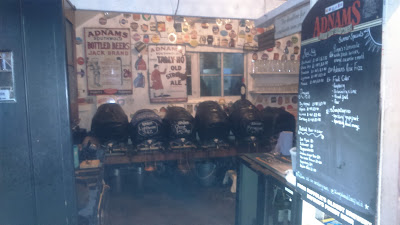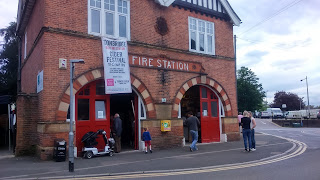About a week ago,
Essex-based beer writer, Justin Mason
wrote an interesting piece bemoaning the disappearance of the
local beer guide.
Once an essential tool when visiting an unfamiliar part of the country, and a
vital piece of pre-planning, prior to any trip, whether it be business or
pleasure, local pub guides have all but disappeared.
In an attempt to look a little deeper into this, I checked
out the CAMRA website, but could find no specific town or county guides listed at
all. To be fair, the Campaign has recently launched an excellent series of
guides detailing pub walks in popular tourist areas, such as the Lake District,
the Peak District, Yorkshire and, surprisingly, London. However, these guides
though are aimed at people like me, who enjoy a lengthy walk in the countryside
before arriving at the pub, and are not the same as the old-style local guides,
which tended to be comprehensive publications, listing all real ale pubs in a
specific locality.
There are several reasons for the disappearance of local
guides, not least of which is the amount of work involved in their production.
The number of boots on the ground needed to carry out surveys of all the pubs
in a given area is beyond the reach of many CAMRA branches, and on top of this
is the significant amount of man hours necessary to complete the various stages
involved with the design and layout. And all of this is BEFORE the guide even
goes to print!
Then there is the often horny issue of finance. CAMRA HQ
will normally provide a loan, but branches need to submit a proper business
plan and then wait for approval. Given the often complex committee structure
within CAMRA, this can sometimes take longer than you think, as my CAMRA branch
discovered seven years ago.
It doesn’t end there of course, as once your guide arrives
back from the printers; you’ve then got to get out there and start selling copies!
West Kent CAMRA produced a guide in 2009, in conjunction with two neighbouring
branches. It was a massive undertaking, and I’m pretty certain at least one of
the editors came close to being divorced by his wife, due to the inordinate
amount of time spent on the editing, layout and design of the guide!
On the plus side, the Gateway to Kent Guide won best local
CAMRA guide for 2010, but there are still some outstanding accounting issues to
be dealt with before a line can finally be drawn under the project, and a number of guides remain unsold. It is highly unlikely that the branch will
be producing a follow on, as the will and the drive necessary for such an
undertaking just isn’t there.
On the subject of editing, a couple of CAMRA colleagues
involved with entering the Good Beer Guide survey information have told me what
a thankless and at times soul-destroying process this is. There are
considerable variations in the standard of written English used by surveyors,
and it is not unusual for what is written to make little sense. Information
such as telephone numbers, website addresses, opening times often needs
re-checking as well; so remember this next time you’re thumbing through your
copy of the GBG, as the guide owes its freshness and appeal to a small
handful of unpaid volunteers, rather than the paid staff at St Albans who claim all
the credit!
As if the above reasons were not enough, the rise of
electronic guides is undoubtedly responsible, more than anything else, for the
demise of paper and ink ones. The ease by which virtual or e-guides can be
created and distributed, knocks spots of the printed version, and the beauty of
electronic guides is they can be updated, without the need for a full re-print.
CAMRA’s WhatPub has probably got the whole e-guide market
sewn up now; even though the system, and the associated database, involved a
massive amount of work to begin with. However, now
WhatPub is up and running,
it is easily updated, and is thus far more current than any printed guide –
including the
GBG, which is surveyed in
December and
January, before hitting
the book shops at the back end of
September. It is not uncommon therefore for
pub entries to be at least six months out of date by the time it is launched.
Contrast this with
WhatPub where, should I find some changes
have occurred to one of our local pubs, I can fill in the new details on-line
knowing the system will pass then straight to our guide webmaster, who will
then update the entry for the pub concerned. Yet again electronic guides win
hands down compared to printed versions.
Of course CAMRA doesn’t have a monopoly on pub guides, and
other organisations, such as “Which” and the Good Pub Guide publish their own
version, usually annually. Brewers, such as Greene King and Whitbread – in the
past, have also published guides, but these only featured pubs tied to the
company concerned.
I still miss local printed guides though, as there was
something special in choosing and ordering one and then waiting for it to
arrive. If it was a good guide, and most tended to be, it helped set the scene
as to what the visitor could expect. Our own Gateway to Kent Guide contained
features on local breweries, cider, hop-picking, brewery history and beer festivals, as well as
essential tourist information such as how to reach many of the pubs using
public transport, on foot or by cycling. It was also lavishly illustrated with
dozens of colour photos of our most striking pubs, scenic views and other items
of local interest.
Justin ended his
article with a plea for guides which would complement the
Good Beer Guide in its championing of real ale. The national guide is, by nature, limited for space, so a series of more local guides could point visitors to other successful pubs which stay the course, and continue to thrive and grow year on year, alongside places which are up and coming. He claimed these guides could direct visitors to the best places today, whilst serving as reference guides for the next generation of drinkers, who, might look back and wonder what all the fuss was about.
Things sometimes end up going full circle, so there may still be a possibility of local guides re-appearing sometime in the future. If they do, they will probably be in electronic form, rather than traditional pen and ink, but at least they will be there pointing people in the right direction to find that elusive combination of the perfect pint in the perfect pub!

























